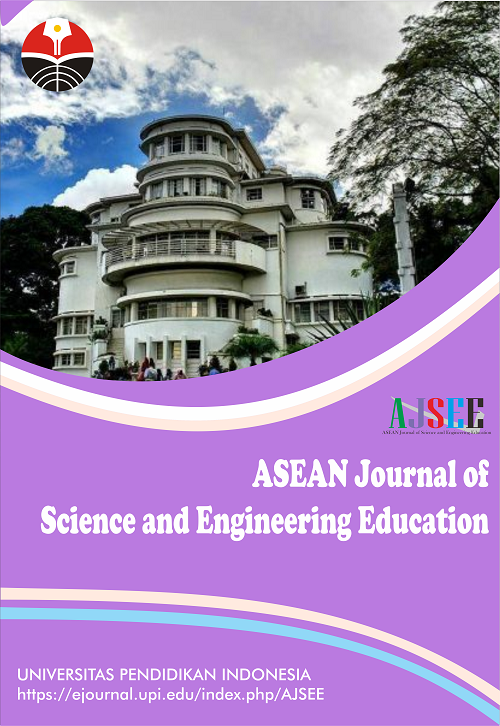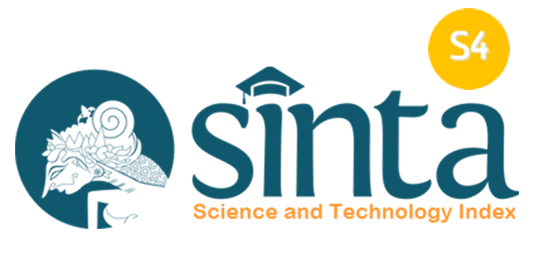Improving the Performance and Knowledge Retention of Aircraft Maintenance Engineering Students in the Theory of Flight through STAD Cooperative Learning
Abstract
Keywords
Full Text:
PDFReferences
Anwar, K., Shaikh, A. A., Dash, N. R., and Khurshid, S. (2012). Comparing the efficacy of team-based learning strategies in a problem-based learning curriculum. Apmis, 120(9), 718-723.
Asamoah, D., Shahrill, M., and Abdul Latif, S. (2022). A review of formative assessment techniques in higher education during COVID-19. The Qualitative Report, 27(2), 475-487.
Asamoah, D., Sundeme, B., Adusei, A., Occansey, M. K. K., and Ntim, W. N. (2019). Ensuring content representativeness: Perceptions of senior high school teachers in Ghana. International Journal of Educational Technology and Learning, 6(1), 2523-0581.
Avison, D. E., Lau, F., Myers, M. D., and Nielsen, P. A. (1999). Action research. Communications of the ACM, 42(1), 94-97.
Chan, L. L., and Idris, N. (2017). Cooperative learning in mathematics education. International Journal of Academic Research in Business and Social Sciences, 7(3), 540-553.
Coman, E., Picho, K., McArdle, J., Villagra, V., Dierker, L., and Iordache, E. (2013). The paired t-test as a simple latent change score model [Opinion]. Frontiers in Psychology, 4, 738.
Creswell, J. W., and Creswell, J. D. (2017). Research design: Qualitative, quantitative, and mixed methods approaches. Sage Publications, 8(2011), 107-121.
Duraman, H. S. A. H., Shahrill, M., and Morsidi, N. M. H. (2015). Investigating the effectiveness of collaborative learning in using the snowballing effect technique. Asian Journal of Social Sciences and Humanities, 4(1), 148-155.
Ebil, S., Salleh, S. M., and Shahrill, M. (2020). The use of e-portfolio for self-reflection to promote learning: A case of TVET students. Education and Information Technologies, 25(6), 5797-5814.
Fisher, M. J., and Marshall, A. P. (2009). Understanding descriptive statistics. Australian Critical Care, 22(2), 93-97.
Foldnes, N. (2016). The flipped classroom and cooperative learning: Evidence from a randomised experiment. Active Learning in Higher Education, 17(1), 39-49.
Ghaith, G. (2001). Learners’ perceptions of their STAD cooperative experience. System, 29(2), 289-301.
Hamdan, M. K. K. H., Salleh, S. M., Shahrill, M., and Asamoah, D. (2022). Improving conceptual knowledge and soft skills among vocational students through inquiry-based learning in a flipped classroom. International Journal of Social Learning, 2(2), 235-249.
Haynie, W. J. (1997). Effects of anticipation of test on delayed retention learning. Journal of Technology Education, 9(1), 20-30.
Hong, Y., Chen, L.-G., Huang, J.-H., Tsai, Y.-Y., and Chang, T.-Y. (2022). The impact of cooperative learning method on the oral proficiency of learners of the training program for English tourist guides. Frontiers in Psychology, 13(6), 1-13.
Jainal, N. H., and Shahrill, M. (2021). Incorporating Jigsaw Strategy to Support Students' Learning through Action Research. International Journal on Social and Education Sciences, 3(2), 252-266.
Johnson, D. W., and Johnson, R. T. (1999). Making cooperative learning work. Theory into Practice, 38(2), 67-73.
Kani, N. H. A., and Shahrill, M. (2015). Applying the thinking aloud pair problem solving strategy in mathematics lessons. Asian Journal of Management Sciences and Education, 4(2), 20-28.
Kent, S., Wanzek, J., Swanson, E. A., and Vaughn, S. (2015). Team-based learning for students with high-incidence disabilities in high school social studies classrooms. Learning Disabilities Research and Practice, 30(1), 3-14.
Khalid A. A-S. (2016). The effect of using active learning strategies on secondary EFL learners’ grammar achievement. American Journal of Educational Research, 7(4), 309-312.
Khun-Inkeeree, H., Omar-Fauzee, M. S., and Haji Othman, M. K. (2018). The effects of student achievement team-division (STAD) on achievement and retention in mathematics of Thai Students. European Journal of Education Studies, 5(2), 33-47.
Li, M., Yin, D., Qiu, H., and Bai, B. (2021). A systematic review of AI technology-based service encounters: Implications for hospitality and tourism operations. International Journal of Hospitality Management, 95, 1-10.
Lim, M. T. L., Shahrill, M., Mundia, L., Tengah, K. A., Tan, A., and Mahadi, M. A. (2016). An alternative approach to teaching: Implementing a cooperative learning strategy students team achievement division at the junior college level. Advanced Science Letters, 22(5-6), 1725-1729.
Listiadi, A., Sulistyowati, R., and Canda Sakti, N. (2019). Improving learning quality through NHT cooperation model in Indonesian vocational schools. KnE Social Sciences, 3(11), 884-902.
Margono, M., R., and Arianto, F. (2021). Attitude development with coaching cooperative in vocational education cadets. Academic Research International, 12(1), 52-60.
Mendo-Lázaro, S., León-Del-Barco, B., Polo-Del-Río, M. I., and López-Ramos, V. M. (2022). The impact of cooperative learning on university students' academic goals. Frontiers in Psychology, 12, 787210.
Mertler, C. A. (2013). Classroom-based action research: Revisiting the process as customizable and meaningful professional development for educators. Journal of Pedagogic Development, 3(3), 38-42.
Munawar, S., and Chaudhary, A. H. (2019). Effect of cooperative learning on the writing skill at elementary level in the subject of English. Bulletin of Education and Research, 41(3), 35-44.
Nurhayati, D. M., and Hartono, (2016). Implementation of cooperative learning model type STAD with RME approach to understanding of mathematical concept student state junior high school in Pekanbaru. AIP Conference Proceedings 1848, 1-5.
Rachmawati, L. A., Supriyanto, T., and Doyin, M. (2019). The effectiveness of learning to write poetry with the student team achievement division (STAD) model. Journal of Primary Education, 8, 248-253.
Rahmatika, A. (2019). The effectiveness of student team’s achievement division to teach writing viewed from students’ creativity. International Journal of Language Education, 3, 46-54.
Rivera-Pérez S, Fernandez-Rio, J., and Iglesias, G. D. (2020). Effects of an 8-week cooperative learning intervention on physical education students’ task and self-approach goals, and emotional intelligence. International Journal of Environmental Research and Public Health, 18(1), 1-11.
Salleh, S. M., Musa, J., Jaidin, J. H., and Shahrill, M. (2021). Development of TVET teachers’ beliefs about technology enriched instruction through professional development workshops: Application of the technology acceptance model. Journal of Technical Education and Training, 13(2), 25-33.
Sirisrimangkorn, L., and Suwanthep, J. (2013). The effects of integrated drama-based role play and student team’s achievement division (STAD) on students’ speaking skills and affective involvement. Scenario Journal of Drama Theatre for Secondary Language Education, 2, 62-76.
Tran, V. D. (2014). The effects of cooperative learning on the academic achievement and knowledge retention. International Journal of Higher Education, 3(2), 131-140.
van Ryzin, M. J., and Roseth, C. J. (2018). Cooperative learning in middle school: A means to improve peer relations and reduce victimization, bullying, and related outcomes. Journal of Educational Psychology, 110(8), 1192-1201.
Vernon, D. S., Schumaker, J. B., and Deshler, D. D. (2020). The social and academic effects of cooperative learn strategy instruction in inclusive elementary classes. Learning Disability Quarterly, 45(3), 185-198.
Wyk, M. M. (2012). The effects of the STAD cooperative learning method on student achievement, attitude, and motivation in economics education. Journal of Social Sciences, 33(2), 261-270.
Yapici, H. (2016). Use of jigsaw technique to teach the unit “science within time” in secondary 7th grade social sciences course and students' views on this technique. Educational Research and Reviews, 11(8), 773-780.
Wang, Y. P., and Wu, T. J. (2022). Effects of online cooperative learning on students’ problem-solving ability and learning satisfaction. Frontiers in Psychology, 13, 817968.
Yussop, M. A. H., Shahrill, M., and Latif, S. N. A. (2021). Self-reliant learning strategy in vocational and technical education: Insights from group collaboration. International Journal of Social Learning, 1(3), 283-303.
Zhou, Z. (2017). On the strategy to enhance the efficiency of the cooperative learning method in the college English teaching in China. Theory and Practice in Language Studies, 7(11), 1091.
DOI: https://doi.org/10.17509/ajsee.v3i2.49336
Refbacks
- There are currently no refbacks.
Copyright (c) 2022 Universitas Pendidikan Indonesia

This work is licensed under a Creative Commons Attribution-ShareAlike 4.0 International License.














